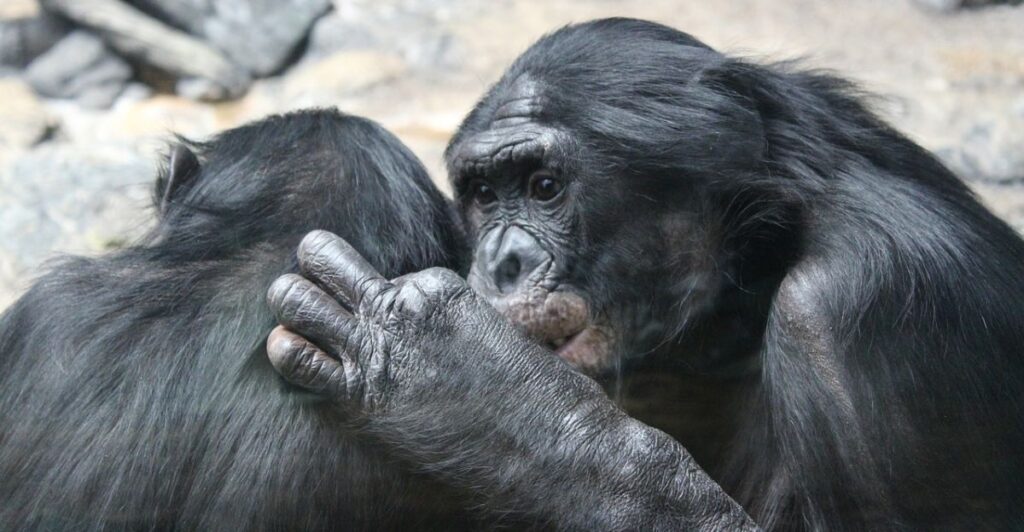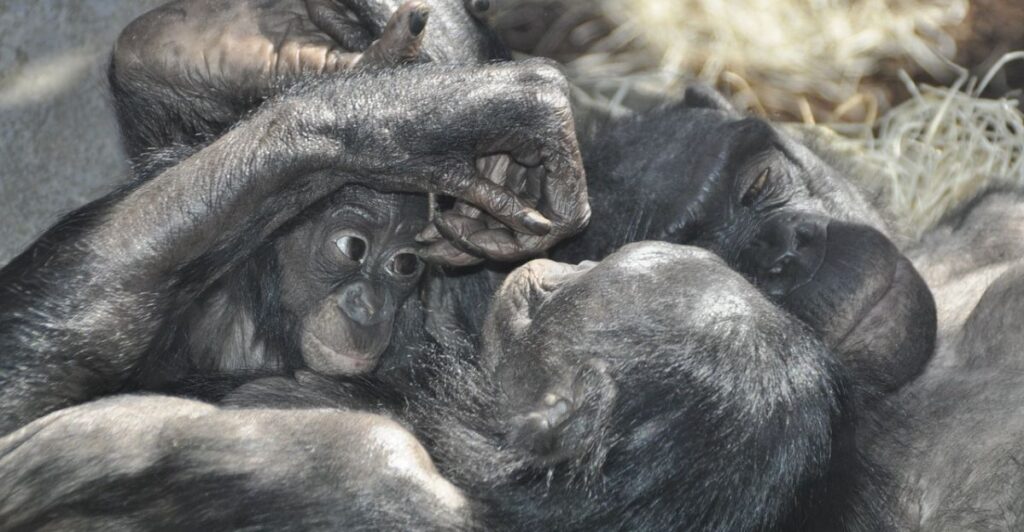
Bonobos may share 98.5% of our DNA, but they live life with way less drama. These great apes are peaceful and just might be better at handling relationships than we are. Let’s get to know the smart, quirky cousins of ours.
1. Bonobo Females Rule the Group

In bonobo society, size doesn’t determine power. Females may be smaller than males, but they lead the group through strong alliances and cooperation. The “sisterhood” they form keeps everything running smoothly. Sorry, fellas— in the bonobo world, female teamwork does make the dream work.
2. These Apes Are Quick to Settle Conflicts

Tension in bonobo groups rarely lingers because they have figured out peacekeeping tricks long back. Grudges don’t stand a chance while grooming, and a little intimate bonding quickly restores harmony. You can say that the conflict resolution skills here can put human office drama to shame.
3. They Talk and Laugh

Bonobos have an entire playlist of sounds. For example, high-pitched barks and giggle-like laughter. The vocal range is just impressive. Each sound communicates something different, and it’s not just noise; it’s bonobo-speak in action. Good luck figuring out bonobo jokes.
4. They Have a Long Childhood

Young bonobos aren’t in a rush to grow up. The kids stick close to their mothers for years, picking up survival and social tricks. It’s like an extended bonobo boot camp for life skills. Here, the sons of high-ranking females enjoy a better position among male bonobo groups.
5. Bonobos Don’t Practice Infanticide

While some apes have dark sides, bonobos take a different path. They do not practice infanticide. In bonobo families, all babies are safe and sound, which keeps the vibe peaceful. Maybe such a focus on harmony helps everyone stay calm, including the toddlers.
6. Mirrors Can’t Fool Them

Mirror, mirror, on the wall; bonobo knows who they are. A bonobo can recognize its mirror reflections, passing the self-awareness test with ease. No, it’s not vanity; it’s a sign of high-level thinking. A bonobo would probably ace a selfie session if given the chance.
7. They Have a Big Heart and Even Bigger Emotions

Honestly, we can learn some empathy from them. Bonobos don’t leave anyone hanging. When a group member is upset, they step in with a hug, some grooming, or a reassuring pat. It’s a way of saying, “I’ve got your back.”
8. Sharing is Caring at The Tables

Bonobos don’t hoard snacks. When food is on the table, they’re happy to share—even with those outside the inner circle. Unlike chimpanzees, who guard their grub, bonobos show a generous spirit. Everyone eats, and everyone shows mealtime manners.
9. Bonobos are Pro Nest-Builders

Every night, bonobos get crafty with branches and leaves to build a cozy tree nest. Such nightly retreats keep them safe and comfortable. You’d think they hired an interior designer with how efficient they are. So, who needs a bed in the jungle when you’ve got skills like this?
10. Our Ancient Cousins Love a Good Mystery

If something new pops up, bonobos can’t resist checking it out. They poke, prod, and explore with enthusiasm. Objects, places, or situations—the apes want to know what’s up. That curiosity keeps them sharp, adaptable, and always learning something new.
11. Calm, Non-Territorial Nature

Our cousin apes are not “territorial tyrants” like us because bonobos don’t get worked up over territory lines. If another group overlaps into their range, it is no big deal. While other apes and humans fight over turf, bonobos are too busy keeping the peace. They’re living proof that peace is indeed the way to happiness.
12. Bonobos Face an Uncertain Future

Sadly, bonobos’ survival is anything but secure. The IUCN classifies bonobo apes as endangered due to our actions that caused habitat loss, poaching, and conflict in the Congo. With growing threats, these intelligent apes need all the help they can get to stay off the extinction list.
Stay connected with us for more stories like this! Follow us to get the latest updates or hit the Follow button at the top of this article, and let us know what you think by leaving your feedback below. We’d love to hear from you!







